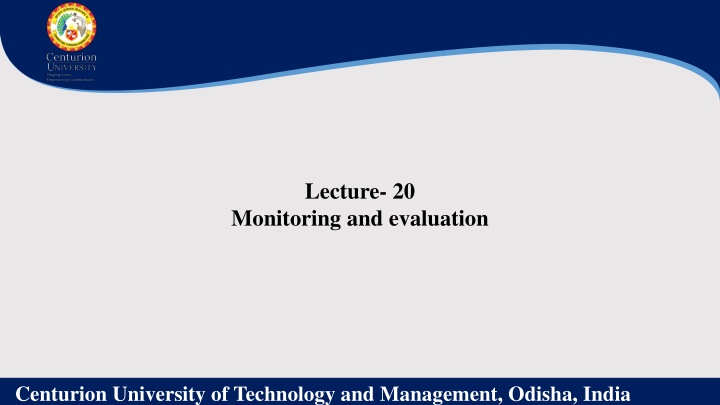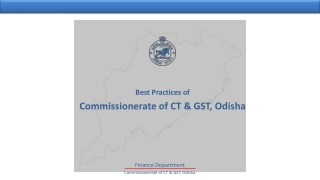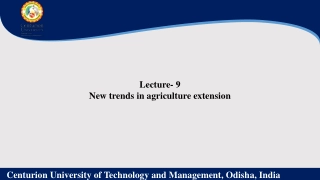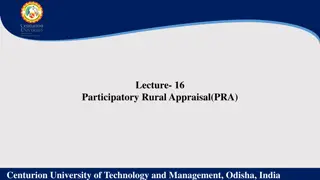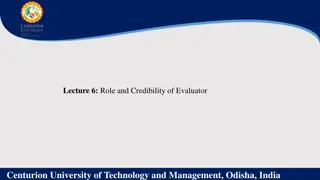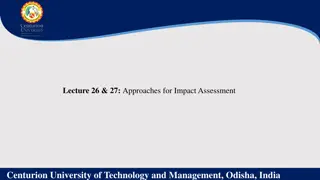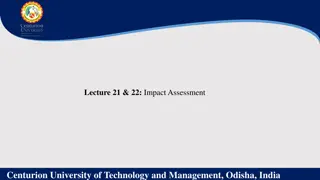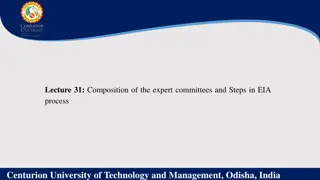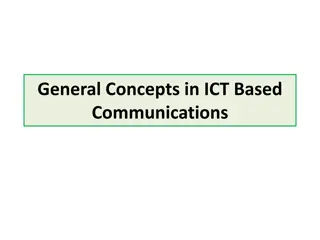Importance of Monitoring and Evaluation in Extension Activities at Centurion University, Odisha, India
Monitoring and evaluation play vital roles in ensuring the success and effectiveness of extension activities at Centurion University in Odisha, India. Monitoring involves continuous observation of operations to assess if objectives are being met, while evaluation focuses on determining the impact of extension programs and the achievement of desired behavioral changes. Different types and purposes of evaluation are discussed, emphasizing the need for systematic and objective assessment to improve rural education and program outcomes.
Download Presentation

Please find below an Image/Link to download the presentation.
The content on the website is provided AS IS for your information and personal use only. It may not be sold, licensed, or shared on other websites without obtaining consent from the author.If you encounter any issues during the download, it is possible that the publisher has removed the file from their server.
You are allowed to download the files provided on this website for personal or commercial use, subject to the condition that they are used lawfully. All files are the property of their respective owners.
The content on the website is provided AS IS for your information and personal use only. It may not be sold, licensed, or shared on other websites without obtaining consent from the author.
E N D
Presentation Transcript
Lecture- 20 Monitoring and evaluation Centurion University of Technology and Management, Odisha, India
MONITORING Monitoring is an integral and important part of a management information system . Monitoring simply means to keep a watch on what is happening. done at the operational level. involves collection and analysis of information. monitoring should be a continuous process. Monitoring reveals whether the components of the extension service are operating as desired. done through survey, baseline, meetings, discussions, reporting, structured interviews, questionnaire. Centurion University of Technology and Management, Odisha, India
EVALUATION A very necessary step for extension activity. It is necessary to know how many new things of agriculture the farmers have learnt from the extension activities. Programme evaluation is the determination of extent to which the desired objectives have been achieved. Evaluation is the comparison of the situation before and after a development programme has operated with an area for a predetermined period (Metthew, 1956). determining how well the desired behavioral changes have taken place or taking place because of extension education effort. Centurion University of Technology and Management, Odisha, India
Objectives of Evaluation Determining how well the desired behavioural changes taking place because of extension education effort. Inspire for the evaluation of objectives. Know the merits and demerits of the programme. Increase the self-confidence in both the rural people and extension worker. Finding the expenses and achievements of a programme. Find out the usefulness of new experimental teaching methods. Centurion University of Technology and Management, Odisha, India
Types of evaluation According to purpose: Formative evaluation: gathers data for development of an effective extension programme. measure end results of a programme in order to decide whetheror not it should be continued or discontinued. According to stage evaluation: Ongoing or process evaluation. Outcome evaluation. Centurion University of Technology and Management, Odisha, India
According to the nature of evaluation Causal every-day evaluation Self-checking evaluation Do-it-yourself evaluation Extension studies Scientific research Scientific research must be Factual Analytical Reliable Objective Impartial: Centurion University of Technology and Management, Odisha, India
Informal Education (i) Incidental and spontaneous (ii) Not-pre-planned. (iii) Not imparted by any specialised agency. (iv) No prescribed time-table or curriculum. (v) May be negative also (vi) Self learning (vii)No teacher (viii)No degrees and diplomas awarded Centurion University of Technology and Management, Odisha, India
Formal Education 1. Planned with a particular end in view. 2. Limited to a specific period. 3. Well-defined and systematic curriculum 4. Given by specially qualified teachers. 5. Includes activities outside the classroom 6. Observes strict discipline. 7. Attendence is compulsory 8. Curriculum fixed and pre-decided subjects Centurion University of Technology and Management, Odisha, India
Non formal education Derived from the expression 'formal education. Outside the realm of formal education. Conscious and deliberate. To be organised for a homogeneous group. Serving the need of the identified group. Centurion University of Technology and Management, Odisha, India
